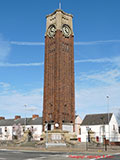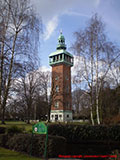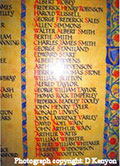Private Ernest William Bonser, 10248
- Batt - 1
- Unit - Coldstream Guards
- Section -
- Date of Birth - 1894
- Died - 14/09/1914
- Age - 20
Add to this record?
If you have photographs, documents or information that can contribute to this record, you can upload here
ContributeSource: Michael Doyle Their Name Liveth For Evermore: The Great War Roll of Honour for Leicestershire and Rutland. He was the son of William Bonser a coal miner and charge man, born 1868 in Hugglescote, Leicestershire and his wife Rebecca Selby Bonser (nee Parker, married on the 3rd April 1893 in Emmanuel Church, Loughborough, Leicestershire), born 1869 in Wood Thorpe, Leicestershire. Ernest William was born in the 2nd quarter of 1894 in Coalville, Leicestershire and was baptised on the 6th May 1894 in the Parish Church, Coalville, in March 1901 the family home was at 11, Forest Road, Hugglescote. In the 4th quarter of 1908 Ernest’s mother died in Hugglescote, aged 39. In April 1911 Ernest was employed as a coal miner and was residing in the family home at 11, Forest Road, Hugglescote, together with his father, a coal miner and step mother Edith Bonser (nee Andrews, married on the 31st July 1909 in the Parish Church, Hugglescote), born 1885 in Hugglescote, and his half blood sibling, Thomas Henry Andrew Bonser, born 1911 in Hugglescote. Ernest’s father died in March 1943 in the Ashby de la Zouch, Leicestershire district, aged 75.
The Brigade of Guards service records all exist, but were deposited in 2018 with the Ministry of Defence in Glasgow, the exception being the Scots Guards, whose service records are located in Edinburgh. Access to these records is available at the current cost of £30.00 per inquiry (2019). This makes it impractical for researchers who, like myself have in excess of over 400 members of the Brigade of Guards to research, as a consequence all that is known of Ernest from military documents that are available in the public domain is that he had enlisted into the Brigade of Guards prior to the outbreak of war, and at the completion of his training was posted as a Private to the Coldstream Guards, it is not known on what date he completed his first period of service with the Colours before his transfer to the Army Reserve. He was mobilized on the outbreak of war and joined the 1st Battalion Coldstream Guards as a Private and was allotted the service number 10248, and with this unit he first entered the theatre of war in France on the 13th August 1914. He was killed in action on the 14th September 1914. He was awarded the 1914 STAR, British War Medal and Victory Medal.
The War Diary records: 14 Sept-14 – BATTLE of the AISNE. A22 detailed reports, orders etc. were lost during period October 29th – November 2nd. The Battalion acted as advanced guard to the Division and was directed to move North over high ground between VENDRESSE and PAISSY finally reaching and taking CERNY – en - LAONNOIS, from which a retirement was ordered after dusk. The final position held being on the spurs running North East from VENDRESSE and PAISSY. The Battalion was relieved and withdrew behind (South of) VENDRESSE during the night. Casualties. KILLED 11 other ranks. WOUNDED 10 officers. 180 other ranks. MISSING 1 officer. 162 other ranks. WOUNDED Lieutenant Colonel J. PONSONBY D.S.O., Major C. J. C. GRANT, Captain G. H. BROWN, Captain G. J. EDWARDS, Lieutenant G. K. F. SMITH, Lieutenant J. B. S. BOURNE-MAY, Lieutenant D. M. HALL, 2nd Lieutenant G. R. LANE, 2nd Lieutenant Honourable D. BROWNE, 2nd Lieutenant C. E. TUFNELL, MISSING 2nd Lieutenant Honourable G. FREEMAN-THOMAS.
On Friday November 13th 1914 The Leicester Journal published the following article under the heading. “LOUGHBOROUGH MISSING SOLDIER.” – Drummer E. W. Bonser, of the 1st Battalion Coldstream Guards, has been reported missing since September 14. He is the son of Mr. Wm. Bonser, of Hugglescote, and grandson of Mrs. Parker, of 7, Leopold-street, with whom he lived for years previous to enlisting in the Guards some fifteen months ago. He was employed at the Loughborough Falcon and Empress Works, and has many friends in the town.
Source: Leicestershire War Memorials Project. Coalville Times Article, Friday 16th October 1914:
HUGGLESCOTE SOLDIER REPORTED MISSING
Information was received on Wednesday by Mr W. Bonser, of 166, Thorpe Cottages, Crescent Road, Hugglescote, that his son, Pte. E. W. Bonser, No. 10318, of the 1st Battalion, Coldstream Guards, was listed as missing after an engagement on September 14th.
The letter, which is from the Colonel of the regiment states that “missing” does not necessarily mean that the soldier is killed or wounded. He may be an unwounded prisoner or temporarily separated from his regiment. Any further information will be sent as soon as it is received.
Coalville Times article – Friday April 2nd, 1920
WAR MEMORIAL AT HUGGLESCOTE CHURCH
UNVEILED BY COL. R. E. MARTIN
A tablet which has been placed in Hugglescote Parish Church, to the memory of men from the parish who fell in the war, was unveiled by Lt.-Colonel R. E. Martin, C.M.G., on Saturday afternoon in the presence of a large congregation.
The tablet is of excellent design, in keeping with the handsome edifice, and is of a permanent character, the names of 101 men being inscribed on Swithland slate, set in a frame of Ketton stone, surmounted by a cross and crown encircled in a carved laurel wreath, with similar carvings on either side. The inscription runs as follows:
“Their name liveth for evermore.”
“To the Glory of God, and in imperishable memory of the men of the parish who fell in the great war, 1914 – 1918.”
The names of the men inscribed on the tablet are as follows:-
H. A. Attwood, C. T. Beadman, J. Brooks, W. Baker, J. E. Briggs, H. G. Blackham, J. T. Bishop, J. Barrs, G. Barrs, R. Beadman, E. Bonser, G. Beale, J. G. Bennett, E. S. Boot, W. Berrisford, F. J. Betteridge, F. P. Benistone, J. W. Cawley, F. Chamberlain, J. A. Crookes, R. A. Cross, L. Cross, J. Cox, P. Cliff, J. W. F. Collier, C. Drewett, H. B. Drewett, S. Dodds, A. Elkin, H. C. Elkin, J. Farn, H. Fletcher, H. Finch, L. Finch, G. Firban, G. Gadsby, A. Gamble, S. F. Gamble, W. Gray, W. O. Hoden, O. Hallam, B. Hatter, J. Haywood, W. Hill, F. Hill, J. E. Hibbert, G. Hart, G. H. Highfield, E. Harper, J. W. Harper, H. Hall, J. E. Holmes, J. Jones, W. Jones, F. J. Kirby, I. V. Kelham, H. Lewis, W. Lewis, W. Massey, H. O. Moseley, T. Marriott, G. Martin, J. A. Moult, J. Maunders, J. Moon, I. Mycroft, W. Newbold, O. H. Pratt, J. A. Pegg, F. Pink, E. H. Palmer, W. Riley, A. T. Richardson, W. Rogers, C. Simmons, E. A. Stinchcombe, J. Summers, S. Summers, C. Shilton, G. Slatter, J. Smith, J. C. Shaw, S. Smith, G. Spencer, S. C. Smith, J. W. Setchell, W. Statham, A. G. Tovell, S. T. Timson, J. Tebbatt, F. Whitmore, E. Willett, B. Walker, H. Watson, C. H. Walker, J. Woods, T. Willett, A. Wright, A. Wood, J. Young and W. Young.
As the congregation passed into the church, members of the Hugglescote Church Lads’ Brigade, with the ex-Sergt.-Major W. Hill in charge, lined up on either side of the entrance and two of the Brigade with bowed heads and leaning on reversed rifles, stood by the memorial, covered with the Union Jack.
The service, which was very impressive, was conducted by the Rev. Canon Broughton (vicar) and opened with the hymn, “Stand up for Jesus.” Then followed prayers and collects. Psalm 130, and a lesson read by the Rev. J. C. Wallace, after which the clergy and choir proceeded to the memorial, led by the churchwardens, Messrs. W. E. Canner and J. W. Fletcher.
In unveiling the tablet, Colonel Martin said “To the glory of God and in imperishable memory of the men of this parish who fell in the great war 1914 – 1918, I unveil this tablet, which has been erected by their fellow parishioners in grateful recognition of their self-sacrifice.”
The “Last Post” having been sounded by buglers of the Church Lads’ Brigade, the choir and clergy returned to their places and Colonel Martin gave an address from the chancel steps.
He spoke of the memorable days in August 1914, when the principles on which our national life is based were being assailed, and it was the part of every true man to stand in defence of them. They had tangible proof that the spirit which was then evoked in the nation was the same spirit as that shown by their forefathers who went out to fight country’s enemies. He would never forget the day about the end of August, 1914, when the North Midland Territorial Division, which had been mobilised about three weeks, was told to fill up its ranks for service abroad. It fell to him, among others, to come back into Leicestershire to try and explain to the people what they were up against, and he remembered what a splendid response they gave. In the North Midland Division, between 80 and 90 per cent of the men said they were prepared to go anywhere, though many of them were married men who had never experienced Army service before. Many things have happened since – much self-seeking, a desire to get rich quickly, many apparent inequalities of justice and self-sacrifice – but he was sure they could all take comfort from the fact that there was tangible proof given in those days that the nation was sound at heart and could be trusted to do the right thing when the crisis really arose. And what happened when the armies got overseas and began their real work? He ventured to say that no one had the privilege of serving in a better battalion. The men from that district – Coalville men they always called them – were a splendid lot of men filled with genuine enthusiasm for fitting themselves for the part which they had to play, and who on getting across the water, proved themselves as good as the best. He went on to speak of evidences of practical Christianity displayed by the men, and of deeds of heroism which came to his notice. One instance he recalled was when they were between Hill 60 and Ypres. When the Brigadier realised that he had in the ranks men accustomed to mining, he formed a number of Coalville men into a mining section, whose duty it was to construct projecting galleries in front of the trenches, to find out if the Germans were under-mining. One day a member of the party came across a German mine filled with German explosives in large quantities, and it would have been a very natural thing for him to want to get away from it as soon as possible, but instead of that, he crawled over the top and disconnected the mine and came back and reported it to his commanding officer. This man, whose name was Starbuck, had no thought for his own safety, but first took steps to safeguard his comrades.
Proceeding, Col. Martin said his services came to an end in October, 1915, but he had always felt ever since then that the war had been worth while, if for nothing else than for the fine spirit it brought out, and if the same spirit could be shown in regard to present day problems, it would go a long way towards reaching a solution. He was not one of those who said this country ought to have stood aside and have taken advantage of the trade while other countries were fighting. The people, who said that, he thought, were wrong. He thought that what the people of this country did when they found what they were up against should be an example and pattern to them now. If the war had done nothing else, with all the misery, self-sacrifice and sorrow, he believed they were worth while because they afforded the opportunity which was taken by so many of showing a truly Christian spirit. He believed that experience had not been lost, but would help them to get through present day difficulties with credit to themselves.
The closing hymn was 11, “For all the saints,” and a collection was taken for St. Dunstan’s Hostel for Blind Soldiers and Sailors. As the congregation were leaving the church, Mr F. Baxter (organist) played, “O, rest in the Lord.” Before and after the service, peals were rung with the bells half-muffled.
Research undertaken and submitted (including photograph from the Coalville Times) by Andy Murby, September 2017.
- Conflict - World War I
- Cause of death - KILLED IN ACTION
- Other Memorials - Coalville War Memorial Clock Tower, Loughborough Carillon, War Memorial Bell Tower
- Unit - Coldstream Guards
- Cause of death - KILLED IN ACTION
- Burial Commemoration - La Ferte-sous-Jouarre Mem., Seine-et-marne, France
- Born - Coalville, Leicestershire
- Enlisted - Leicester
- Place of Residence - 7 Leopold Street, Loughborough, Leicestershire, England
- Memorial - CARILLON TOWER MEM., LOUGHBOROUGH, LEICS
- Memorial - CLOCK TOWER MEM., COALVILLE, LEICS
- Memorial - ST. PETER'S CHURCH, LOUGHBOROUGH, LEICS




